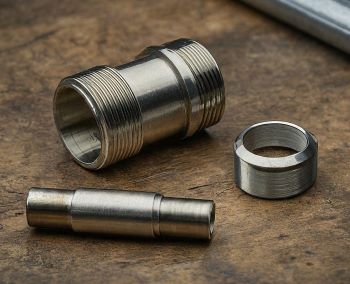Leaking pipes can be a homeowner’s worst nightmare. Not only are they a hassle to fix, but they can also lead to wasted water and potential damage to your property.
Luckily, there’s a simple and effective solution for securing fluid connections. It’s tubing nuts for use in plumbing.
What are Tubing Nuts?
Tubing nuts are small but mighty components that create secure leak-proof connections for tubing. They consist of three main parts:
✅ Nut: This threaded piece screws onto the body.
✅ Body: The body houses the ferrule and provides a secure base for the connection.
✅ Ferrule: This ring-shaped piece is made from a softer material and gets compressed during assembly, creating a tight seal around the tubing.
Benefits of Using Tubing Nuts
Tubing nuts offer several advantages over other methods of connecting tubing:
✅ Secure Connections: Their design ensures a leak-proof seal, preventing unwanted drips and ensuring your plumbing system functions properly.
✅ Easy Installation: Forget complex welding or soldering. Tubing nuts require just a wrench for a quick and user-friendly installation.
✅ Versatility: These handy fittings come in various sizes and materials to accommodate different tubing diameters and applications.
✅ Reusability (Optional): Depending on the material and application, some tubing nuts can be disassembled and reused after proper inspection.
Different Types of Tubing Nuts
The world of tubing nuts offers a variety of options to suit your needs:
➡️ Material Variations: You’ll find tubing nuts in different materials like brass (common for general plumbing), steel (used for high-pressure applications), and even nylon (suitable for some fluids and lower pressures).
➡️ Size Variations: No matter your tubing diameter, there’s a tubing nut size to match, ensuring a proper fit and secure seal.
➡️ Single vs. Double Ferrule (Optional): Some tubing nuts utilize a single ferrule design, while others have a double ferrule for extra security in high-pressure applications.
When choosing a tubing nut, consider factors. These include the material’s fit with your tubing and fluid. Also, the pressure rating for your system and the specific use.
Applications of Tubing Nuts
Tubing nuts have a wide range of uses in various industries:
➡️ Automotive Industry: They’re essential for securing brake lines, fuel lines, and engine cooling system components.
➡️ Industrial Applications: In hydraulic and pneumatic systems, as well as instrumentation, tubing nuts ensure reliable fluid flow.
➡️ Residential Applications (Optional): They play a role in securing lines within refrigerators, air conditioners, and even water filtration systems.
Safety Considerations When Using Tubing Nuts
While tubing nuts are user-friendly, safety is paramount:
✅ Proper Installation: Always follow the manufacturer’s instructions for tightening and assembly to ensure a proper seal.
✅ Material Compatibility: Choose tubing nuts compatible with the tubing material and the fluid being used to avoid potential corrosion or leaks.
✅ Pressure Rating: Select tubing nuts with a pressure rating exceeding the operating pressure of your system for added peace of mind.
Conclusion
Tubing nuts are reliable and versatile. They create secure, leak-proof connections in plumbing. They are used in many applications. They are easy to use, cheap, and have many options. They are a valuable tool for DIY enthusiasts and professionals.
For some uses, or if you’re unsure, consult a plumber. Ask about choosing and installing. Next time you tackle a plumbing project, consider the power of tubing nuts. They can help you get ahead of any potential leaks!
Post time: May-07-2024


